JAVA
History

History

Popular destinations INDONESIA
| Bali | Java | Sumatra |
History of Indonesia
Prehistory
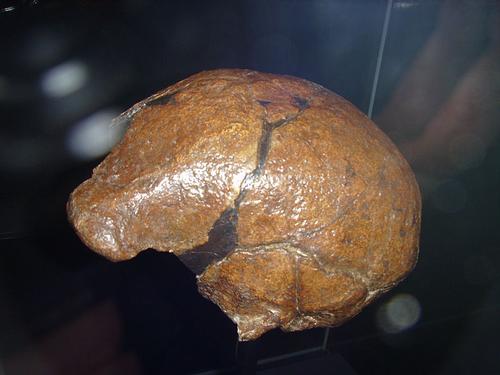 Skull Java Man IndonesiaPhoto:Gerbil CC 3.0 Unported no changes made
Skull Java Man IndonesiaPhoto:Gerbil CC 3.0 Unported no changes made
The first inhabitants of Indonesia lived on Java. The skull of Java man (homo erectus) was found there in 1891. This hominid, which used fire, already walked upright and lived about 500,000 years ago at the beginning of the Pleistocene. The Java man is explicitly not the direct predecessor of the current Indonesian population. In 1931 skulls of a more developed human species, the Solo human, were found.
The first true human species to migrate to the Indonesian archipelago was an Australoid pygmy race, called negritos, from New Guinea and the Lesser Sunda Islands. Later still, about 10,000-12,000 BC, the Wajak man lived in Java, the first homo-sapiens, and the true ancestor of the present population.
Antiquity
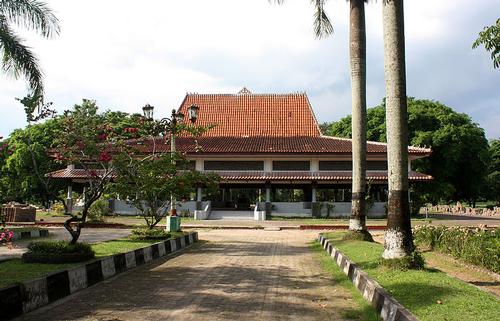 Indonesia Sriwijaya Archaeological ParkPhoto:Gunawan Kartapranata CC 3.0 Unported no changes made
Indonesia Sriwijaya Archaeological ParkPhoto:Gunawan Kartapranata CC 3.0 Unported no changes made
Around the 2nd century AD. the first Indian merchants landed in Java, Sumatra and Sulawesi. It has become clear from ancient writings that Indian historians have been around 600 BC. made mention of Java. The influence of these Indians reached far, but especially the ruling class took over many of these people, especially Hinduism. The many loan words that can be found in the current Indonesian language are also clear evidence of the strong Indian influences. In the 5th century Brahmin sects developed in Java that worship the Hindu god Shiva.
In the 7th century, the Sriwijaya Kingdom came to a head in southern Sumatra, the trading empire that controlled Malacca and Sumatra and shipping from India to China. On Java, especially on the coast, rich and powerful Hindu-Javanese states flourished, including Kediri, Sailendra (Buddhist mountain princes) and Papajaran.
Buddhism is also not to be neglected as a modifying factor in this development: it showed no racial prejudice and displayed a strong missionary activity. The followers of Hinduism and Buddhism, incidentally, lived peacefully side by side.
Towards the end of the 10th century, Java and Sumatra vied for supremacy. The conquests of Airlangga (until 1042) achieved a balance of power in the archipelago: Java controlled the east, Sumatra the west. Sriwijaya was gradually weakened, partly due to a raid by the South Indian Cholas on Malacca and Sumatra. The balance of power remained until the 13th century.
The Majapahit Era, the Golden Age of Indonesia
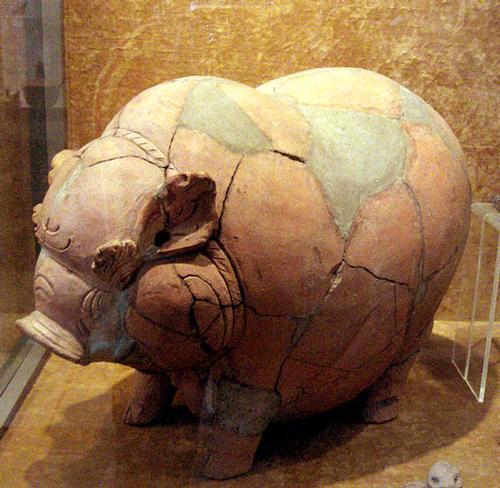
In the 14th century, Majapahit Empire was the most important state of Indonesia, as well as the last Javanese-Hindu kingdom. In the 15th and 16th centuries, Muslim merchants set foot ashore and found well-organized kingdoms, especially in Sumatra and Java; this was much less the case in Borneo and hardly the case in Sulawesi. How strong the influence has been from India is evident from the Indian script that was used in many places until the 20th century.
Arabs had already come to Indonesia in the 4th century to trade. In the 14th century, the activities of the Arab traders expanded considerably towards Indonesia. Inevitably, Islam also gradually entered the archipelago, first from the north of Sumatra and then through Java. In general, it can be said that Islam was most successful in those areas where Hinduism was the least successful. At the end of the 15th century, the first two important cities became fully Islamic, Demak and Cirebon in Java.
Later on, the Hindu Majapahit Empire was left with nothing left and replaced by some twenty Muslim kingdoms scattered throughout the archipelago. Often Hindu princes converted to Islam for monetary gain, and the population followed suit without much difficulty. For example, Islam had a major influence on the development of Indonesia in many areas at that time.
The Portuguese Period
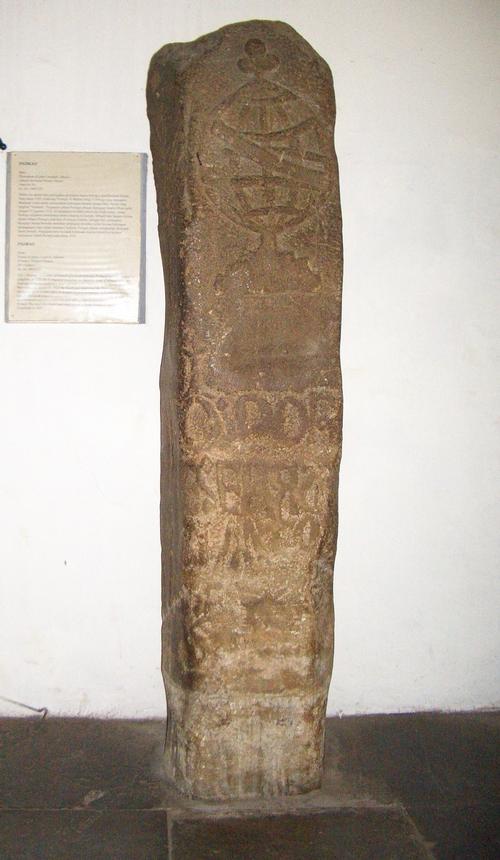 Indonesia Padrão 1522Photo:Hadiyana at the indonesian language wikipedia CC 3.0 no changes made
Indonesia Padrão 1522Photo:Hadiyana at the indonesian language wikipedia CC 3.0 no changes made
The Portuguese period did not last very long, from about 1511 (conquest of Malacca) to about 1662. However, it was they who brought European civilization and culture to Indonesia, including Roman Catholicism and the Portuguese language, which in the 16th century was the trade language or 'lingua franca' of the archipelago. It was remarkable that the Portuguese focused entirely on trade and the spread of Christianity, and not so much on conquering areas. Yet they did not have as much influence on the major international trade routes as later on the Dutch.
In 1570 the Portuguese murdered a sultan in order to get more favors from his successor. However, the people did not accept this and chased the Portuguese from the island of Ternate. It would later turn out that this was the beginning of the end of the Portuguese supremacy in Indonesia.
The great influence of the Portuguese expressed itself in, among other things, the language, music, the import of tobacco and the design and construction of ships.
At the beginning of the 16th century, a new Islamic empire also emerged in Aceh.
Indonesia under the VOC and as a colony of the Netherlands
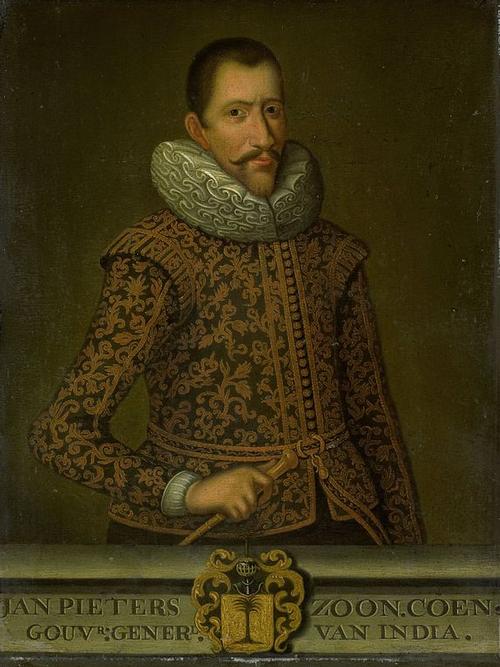 Jan Pietersz.Coen IndonesiaPhoto:Public domain
Jan Pietersz.Coen IndonesiaPhoto:Public domain
With the arrival of the Dutch in 1596, a new and radical chapter in the history of Indonesia began, a chapter that would last more than three centuries. In order to give the trade in this area more structure, the Vereenigde Oost-Indische Compagnie (VOC) was founded in 1602, which after a few years had full control over the archipelago. The Dutch appointed an Indian government under a governor-general and in 1619 Jan Pieterszoon Coen made Jacatra the capital Batavia. He also managed to keep the English out of the archipelago. In the eighteenth century, the power of the VOC was gradually diminished and was taken over by the English worldwide. In 1798, all of the VOC's assets and liabilities were taken over by the state. The once powerful Dutch East India Company ceased to exist in December 1799 and at that time the colonial period of the Dutch East Indies began constitutional law.
Fortified "factories" or trading posts were established in strategic places to protect themselves against other European powers. From 1808, the authority of the Dutch was strengthened under Governor General Daendels. At one point, the Dutch also became increasingly involved in the internal affairs of the various Indonesian states. In 1830, the infamous culture system was introduced, with almost all of Java effectively becoming a state-run labor camp. The farmers were forced to grow specific crops, resulting in, among other things, a major famine in 1849-1850 in the rice region of Cirebon.
The English were the major competitors for the VOC from the early 17th century. Despite agreements between the English and Dutch trading companies, the various parties regularly clashed. From 1811-1816 Java was occupied by an English expeditionary force, and the sultan's "kraton" in Yogyakarta was stormed and destroyed. Stamford Raffles, envoy of the English East India Company and founder of Singapore, was appointed governor. In 1816 most areas were returned to the Dutch (according to the London Convention of 1814), and in 1824 the English withdrew completely from Indonesia.
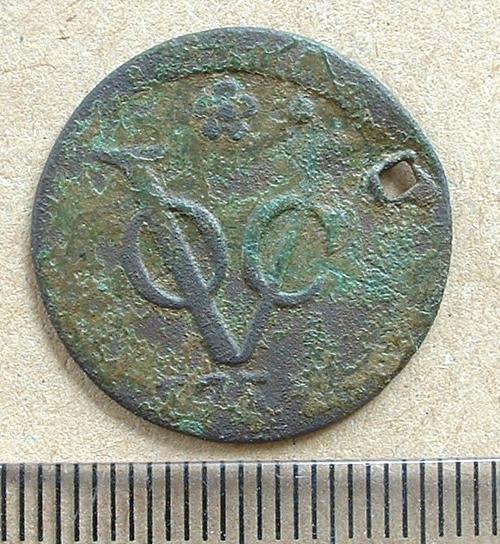 VOC CoinPhoto:The Portable Antiquities Scheme/ The Trustees of the British Museum CC 2.0 no changes made
VOC CoinPhoto:The Portable Antiquities Scheme/ The Trustees of the British Museum CC 2.0 no changes made
Dutch colonial rule was based on a racial caste structure and was governed by a sophisticated civil servant system. Before that time, the immense archipelago was efficiently managed with only a few tens of thousands of civil servants.
Inevitable in a situation of oppression by another people is the emergence of nationalistic feelings. The first nationalists were aristocrats and intellectuals, led by the son of a Javanese sultan, Diponegoro. After an incident, a holy guerrilla war (1825-1830; Java war) was unleashed in 1825, in which approximately 15,000 Dutch and 250,000 Indonesians were killed. Most Indonesians died of contagious diseases. After the constitutional reform of 1848 in the Netherlands, the system of forced cultures was abolished in 1854.
In early 1873, the Aceh War began, a chronic guerrilla war as a result of the plans of the Dutch to annex independent Aceh. It was not until 1898, when Van Heutz and Snouck Hurgronje were appointed military governor and advisor for Internal and Arab Affairs respectively, that the effective, often bloody, occupation of the whole of Aceh began. Until the eve of the Second World War, attacks on Dutch people were regularly carried out.
In 1905, mighty Russia was defeated by little Japan, which was good news for the nationalists. Yet around that time the Netherlands was already engaged in the so-called "ethical politics", with the aim of promoting the importance of the indigenous population and their education for independence, especially through better education. However, Indonesia was still fully in the hands of the Dutch in 1911, although immediately afterwards they started to lose their grip on the country again. To counter this, gifted Indonesians were sent to the Netherlands to receive a high education. However, it was counterproductive because these new intellectuals later became the fiercest nationalists and in fact made the Dutch redundant. During the period of the First World War, many nationalist organizations emerged, especially among the Javanese population. In 1927, Partai Nasionalis Indonesia (PNI) was founded, which openly pursued independence ("Merdeka") and was inspired by the Indian Mahatma Gandhi.
This party was led by Sukarno, who quickly developed into a major political personality through his actions. Earlier, the Budi Utomo ("The Beautiful Endeavor") had been founded in 1908, and in 1912 the Sarekat Islam, a mass movement on an Islamic basis.
Due to the global economic crisis, the Dutch and the Indonesians increasingly faced each other. Exploitation of all mineral resources in Indonesia was increased and political concessions were all reversed.
A very violent police force kept the Indonesians in check and nationalist leaders such as Sukarno, Hatta and Sjahrir were arrested. Furthermore, all political parties were banned and all this naturally led to an increasing anti-Dutch mood. The establishment of a Volksraad in 1918 was nothing more than a bogus parliament. In 1938, for example, the Soetjardo petition was rejected, which should have resulted in Indonesia gradually gaining an independent place within the national context.
WWII
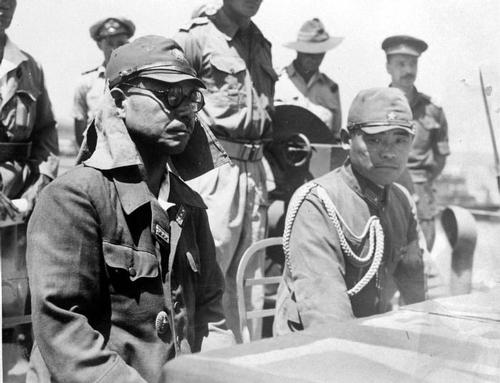 Indonesia Japanese occupationPhoto: Tropenmuseum CC 3.0 Unported no changes made
Indonesia Japanese occupationPhoto: Tropenmuseum CC 3.0 Unported no changes made
In January 1942, Japanese troops entered Borneo and Sulawesi, followed by a major attack on Sumatra. Java was captured on February 27, Batavia was captured on March 1 and the Dutch army capitulated on March 9. The Dutch were interned in camps, where many died (an estimated 13% of the 90,000 civilians and 23% of the 37,000 prisoners of war), including many prisoners who had to work on the Burma-Siam railway.
The Japanese eventually promised the Indonesian nationalists and orthodox Muslims independence, but it soon became clear that the intention was to permanently integrate Indonesia into the Japanese empire, politically and economically it was entirely subordinate to Japan. The methods used by the Japanese to achieve this turned out to be even more cruel than was the case among the Dutch. Meanwhile, the economic situation, especially in rural areas, deteriorated rapidly. Thus the large agricultural enterprises came to a standstill and the situation was aggravated by the requisition of rice for the Japanese troops and the recruitment of labor, the "romushas".
Important to the nationalists was that Sukarno was appointed by the Japanese as governor and thus had the opportunity to develop the Indonesian population in a smart way. The language thus became Bahasa Indonesia, a great symbol of national identity and the armed landstorm, founded by the Japanese, was transformed after the war into a revolutionary militia that fought against the Dutch.
When the Japanese suffered the first losses, power increasingly fell in the hands of the Indonesians.
Indonesia becomes independent
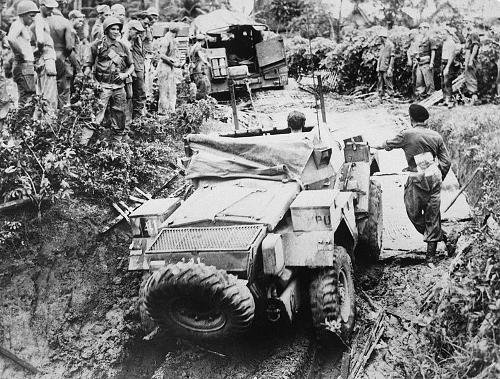 Indonesia Politional ActionsPhoto:Daan Noske/ Anefo in the public domain
Indonesia Politional ActionsPhoto:Daan Noske/ Anefo in the public domain
On August 15, Japan surrendered to the Allies and two days later Soekarno and Hatta declared independence on August 17, 1945 and the Republik Indonesia was a fact. The returned Dutch immediately tried to restore their rule, but encountered fierce resistance, especially in Java and Sumatra. Initially, the Dutch were more bothered by gangs of young people than by the regular army. Initially, the Indonesians received little international support in their fight against the Dutch.
On July 21, 1947, the Netherlands started its first police action, which was stopped on August 5 at the hands of the United Nations. Within the republic it was fermenting between all kinds of groups, which ultimately resulted in a revolt against the pro-Dutch government, led by the communist party PKI.
In 1948 an ultra-conservative government came to power in the Netherlands, which decided to bomb and occupy Yogyakarta in December of that year by Dutch paratroopers. However, this second police action failed completely. Sukarno and many members of his revolutionary cabinet were taken prisoner, but the Dutch faced a lot of opposition from the republican Indonesians. The term "merdeka", meaning freedom, was on everyone's lips at the time.
After world opinion and also the United Nations increasingly supported the Indonesians, the Dutch occupation of Indonesia was soon over. In 1948, the US Congress decided to suspend Marshall support, and on December 27, 1949, the Netherlands transferred sovereignty to a free and independent Indonesia. Initially, the Netherlands and Indonesia were pressed into a union, which, however, was disbanded on August 17. Only in the South Moluccas, where an independent republic had been declared in April 1950, was armed resistance against this development, especially by former KNIL soldiers.
After independence
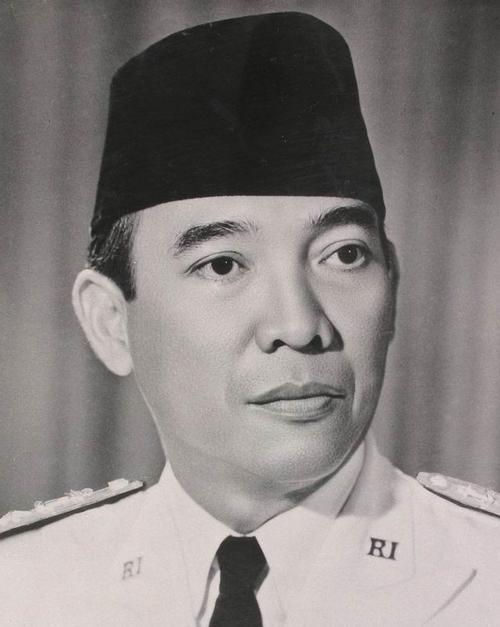
On December 16, 1949, Sukarno was elected president of the new federal state of Indonesia by the House of Representatives and the Senate. In September 1950 Indonesia became a member of the United Nations. The army, the PKI and Sukarno became the main centers of power. In this constellation of growing nationalism and advancing inflation, Indonesia canceled the Union with the Netherlands in 1956 because of the New Guinea dispute.
However, the early years of the young state were far from easy. Cabinets came and went at a rapid pace, and in 1955 there were 169 political parties going to the battle for 257 seats in parliament. Sukarno looked at it with sorrow and decided to intervene. He opted for the so-called "guided democracy" and installed a National Council made up of members elected by himself. The traditional "mufakat" was also introduced, meaning decision-making by consensus. Political parties and legislative bodies were sidelined and even dissolved in this system. The freedom of the press also came to an end.
All this was imposed from Java on the other islands, as a result of which they felt neglected and eventually revolted. In February 1959 an uprising broke out in Sumatra and North Celebes. Geeist became more self-determined through the Muslim-oriented islands. The uprising was crushed by Sukarno's troops within months.
In 1962 Sukarno finally wanted to take West New Guinea and the United States also exerted strong pressure on the Netherlands to give up the island. In the same year, the Netherlands transferred the territory to the United Nations, which in turn transferred it to Indonesia in 1963. It was demanded that free elections had to be called within five years. In 1969 all parties agreed that Western New Guinea would integrate with the Republic of Indonesia.
In the late 1950s, Indonesia had increasingly become a dictatorship and in the early 1960s the country left the United Nations and became fiercely anti-Western and militant. Sukarno put Indonesia on a par with the also anti-imperialist China. Sukarno had been so handy to forge all the different population groups and ideologies into one. Self-aggrandizement was not strange, and this was reflected in the construction of prestigious stadiums and other buildings, and sculptures that were strongly reminiscent of the Soviet style. On the other hand, inflation rose enormously, the national debt rose sharply and various groups such as soldiers, Muslims and communists were ready to take over, if necessary via a coup d'état. There was also a sharp contrast between the military top and the Indonesian Communist Party (PKI).
Coup
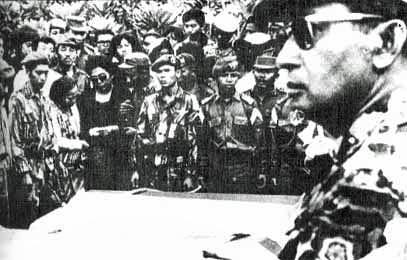 Indonesia Funeral GeneralsPhoto:Public domain
Indonesia Funeral GeneralsPhoto:Public domain
On the night of September 30, 1965, six generals were kidnapped and murdered. Suharto, a previously unknown general, deployed a reserve unit, the KOSTRAD, to teach the "communist conspirators" a lesson. Ultimately, this situation turned into a political carnage in which about half a million people were murdered in cold blood. At that point, the communist party was dissolved and the army took over.
Suharto became president in 1967, who found his base of power in the army. Indonesia received financial aid from all sides, especially from the Netherlands and the United States. This made the country increasingly dependent on the West economically. At home, the people were very dissatisfied with corruption and the development of the economy, and the Suharto regime tried to maintain order by means of strong repressive measures. In 1969, Western New Guinea finally joined Indonesia and further a political reorganization took place, in the sense that a number of groups merged, and continued as Sekber Golkar. This party was strongly supported by the government and won the general election of 1971.
In 1975 the Portuguese troops left East Timor and the liberation movement FRETILIN tried to take power. However, Suharto intervened hard and on July 17 East Timor was unilaterally annexed to Indonesia as the 27th province, under protest from the United Nations.
The 1982 and 1987 elections were again won by the Golkar Party, despite popular discontent and social unrest.
In 1984 a number of Islamic groups revolted against the restrictions on their freedoms. Eighteen people were killed, followed by bomb attacks on Chinese companies and banks.
In the course of 1990 it became known that the government wanted to pursue a policy of "openness". This was expressed in more freedom of the press and a closer approach by Suharto to Islam. It was also remarkable that in 1991 the army killed dozens of protesters, and that Suharto held the army responsible. The years 1991 and 1992 were also marked by tensions in Aceh, resulting in thousands of deaths. In March 1993, Suharto was elected president for the sixth consecutive time. He had to accept General Soetrino, the army candidate, as vice president.
In the mid-1990s the economy grew strongly, but the gap between rich and poor was widening. This resulted in great social tensions, which were reinforced by a rising unemployment rate and many corruption scandals.
In 1996 some new opposition parties were banned and the leader of the Democratic Party, Megawati Sukarnoputri, toppled. The May 1997 general election was again won by the Golkar Party, despite a wave of political violence. Only the Islamic PPP managed to increase its following, gaining 23% of the vote.
The Fall of Suharto
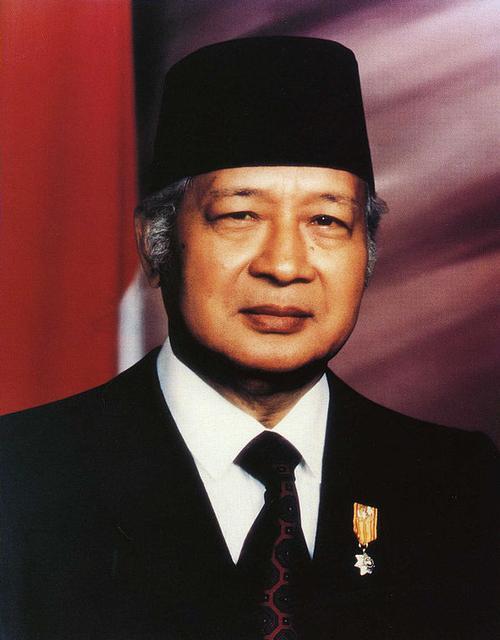
In March 1998, Suharto was re-elected president for the seventh time, appointing his daughter and a number of confidants to key positions, despite growing protests against this turn of events. The economic crisis in which the country found itself, the price rises and crop failures also created a very tense atmosphere. Demonstrations by students campaigning for reform and demanding Suharto's resignation became more massive and received the support of various groups from the military and society. Amien Rais, the leader of the Islamic party Muhammadiyah, was emphatic in this, while Megawati Sukarnoputri, the leader of the PDI, waited quietly.
At the beginning of May 1998, violent riots broke out in various cities, and ethnic Chinese in particular suffered; some 100 Chinese women were raped and a total of 1,200 were killed.
On May 18, the Speaker of the People's Congress and the Golkar called on the President to resign. Suharto tried to set up a national committee, but the important religious leaders and many ministers refused to sit on it. Cornered upon which Suharto then decided to step down. Vice president Habibie was then sworn in as president and in the newly formed cabinet everyone belonging to Suharto's clan disappeared.
Period Habibie
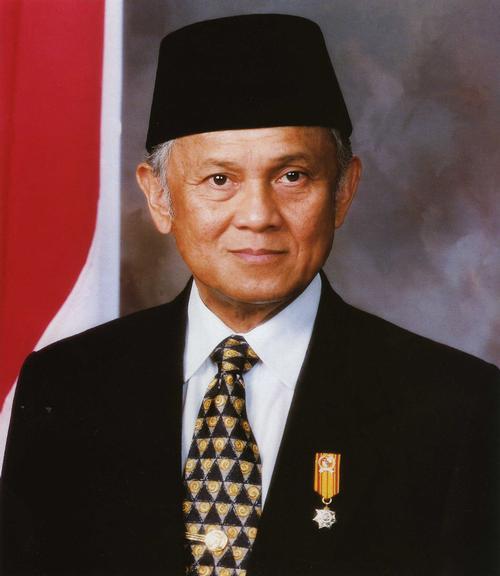
The IMF appeared to have confidence in Habibie, supporting Indonesia with $42 billion in monthly installments of $1 billion. After this, the course of the rupiah recovered.
Under the new regime, a greater degree of freedom of the press was created, which made the military atrocities in East Timor, Aceh and Irian Jaya known. Suharto's corruption and self-enrichment were also widely publicized, yet students continued to demand far-reaching reforms. Not only Suharto would have to answer according to the students, but also the People's Congress, which after all was still appointed by Suharto. The students were dealt with harshly and 14 people were killed in Jakarta alone.
After the disappearance of Suharto, things remained restless in Indonesia. At the beginning of 1999 serious riots broke out in the Moluccas and Borneo, resulting in hundreds of victims.
In January 1999, President Habibie announced a referendum on the future of East Timor against the wishes of the military. The East Timorese resistance agreed because it thought that the population would opt for independence. Forces in the army in particular did not want to let go of East Timor, and recruited militias to intimidate the population into opting for autonomy within Indonesia. Still, a large majority of 78.5% opted for independence. When the results were announced on September 4, the militias, with the help of the army, turned to the scorched earth tactic, which drove about 200,000 people mainly to West Timor. The United Nations then put such pressure on the country that the Indonesian government allowed the arrival of UN soldiers. The imprisoned leader of the East Timorese resistance, Gusmao, was released in September and returned to East Timor in early November 1999, which remained under UN supervision for the time being.
Period Wahid
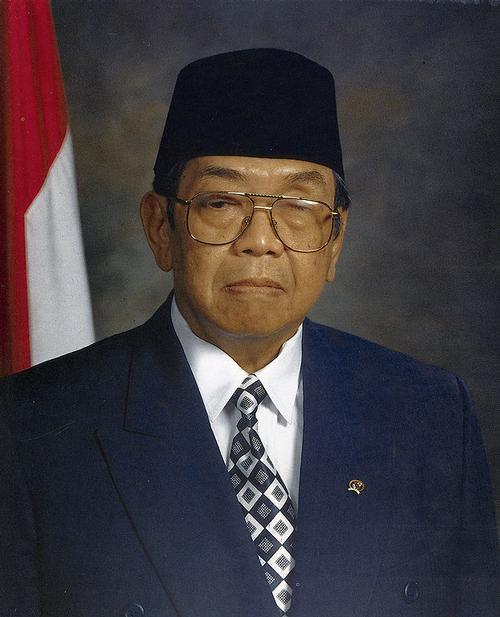
Elections were held in early June 1999. Megawati's reformist PDI-P became the largest party, but under new electoral laws obtained too few seats (153) to enforce a presidency. Habibie's Golkar came in second but got more seats (120) in the new parliament thanks to the same rules. Two other reform-minded parties, Abdurrahman Wahids PKB and Amien Rais' PAN, took 11% and a disappointing 7% of the seats respectively.
There was a sharp contrast between the camp of Megawati on the one hand and that of Habibie's Golkar supported by some Islamic parties on the other. In order to break this polarization, the almost blind Abdurrahman Wahid (known by the people as Gus Dur) was put forward by Amien Rais as the third candidate for the presidency. The military supported this proposal, where Wahid was elected president and Megawati elected vice president at Wahid's insistence.
Wahid's short reign was further characterized by constant quarrels between different political factions, a declining economy and bloody ethnic conflicts, particularly in Aceh, Irian Jaya and the Moluccas. When he was also accused of incompetence and corruption, it was soon over with Wahid.
Period Megawati
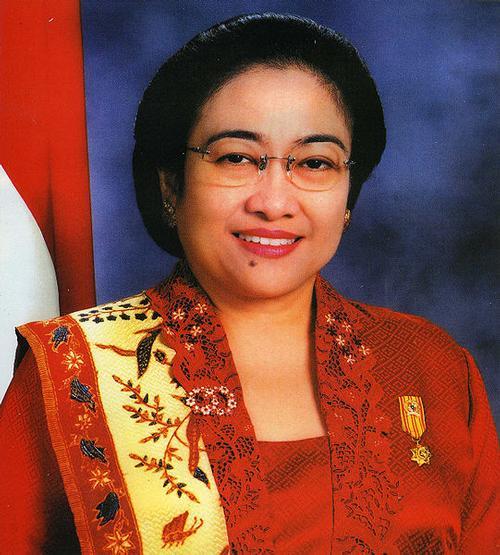
On July 23, 2001, he was voted out by parliament and succeeded by Vice President Megawati, the daughter of ex-President Sukarno. Hamzah Haz was elected vice president.
Bloody ethnic and religious conflicts erupted regularly under Megawati's rule. The army took tough action against actions by separatist movements in Aceh and Irian Jaya. Thousands were killed, but Megawati insisted on keeping her father's Indonesia together.
In early 2002, the Indonesian economy was still in crisis and poverty was still increasing. On October 12 of that year, Indonesia was hit by a very violent extremist attack on Bali. Hundreds of deaths, including many Australians, were the result.
Period Yudhonyo
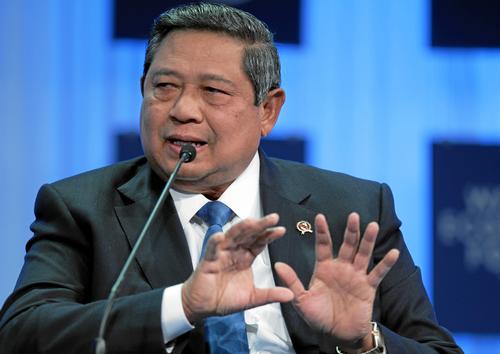 Indonesia Susilo Bambang YudhoyonoPhoto: World Economic Forum CC 2.0 Generic no changes made
Indonesia Susilo Bambang YudhoyonoPhoto: World Economic Forum CC 2.0 Generic no changes made
In early October 2004, Susilo Bambang Yudhoyono was officially declared the winner of the presidential election. The former general defeated incumbent President Megawati Sukarnoputri in the first direct elections of the head of state in Indonesia. Yudhoyono received 60.6% of the vote; Megawati did not get more than 39.4%.
On Boxing Day in 2004, many countries in southern Asia were hit by a massive natural disaster, including Indonesia.
A seaquake occurred that measured 9.0 on the Richter scale. The epicenter of the quake was off the west coast of Sumatra, near the province of Aceh, which was very badly affected.
The quake caused a wall of water to hit the coast of Sumatra. The waves of this so-called tsunami reached a height of ten meters in some places. In total, more than 140,000 people were killed, including more than 95,000 in Sumatra alone.
In December 2006, the first direct elections will be held in Aceh following the peace agreement with the rebels. Former rebel leader Irwandi Yusuf becomes the new governor. Former president Souharto dies in January 2008. In July 2008 the final report of the truth-finding commission of Indonesia and East Timo will be published, asking Indonesia to apologize for the violence in the struggle for the independence of East Timo. President Yudhoyono expressed deep regret, but no real apologies were made. In the May 2009 parliamentary elections, Yudhoyono's party wins votes, in July 2009 he also wins the presidential election. The Muslim cleric Abu Bakar Bashir was arrested in August 2010. Bashir is known as the leader of the terror group Jemaah Islamiah, which has links with al-Qaeda and was behind the 2002 Bali attacks. More than 200 people were killed, mainly tourists from Australia. In 2011, the Dutch government apologized for the massacre in Rawagade during the war of independence. In 2013, the apologies will be repeated in a more general sense.
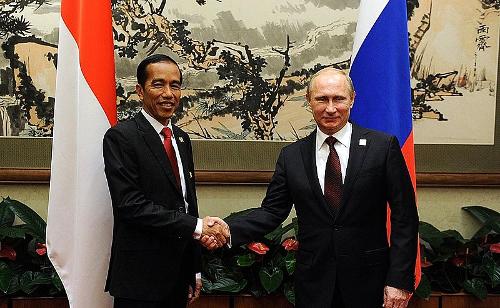 Joko Widodo meets Vlaimir PutinPhoto: Kremlin.ru CC 4.0 International no changes made
Joko Widodo meets Vlaimir PutinPhoto: Kremlin.ru CC 4.0 International no changes made
In the April 2014 elections, the PDI-P and Golkar will be the largest parties. Presidential elections are scheduled for July 2014. Joko Widodo, the governor of Jakarta and ex-general Prabowo Subianto, will fight on July 22, when the electoral council declares that Joko Widodo has become president. In 2015, a number of Europeans and Australians were executed for drug crimes, leading to protests and even recall of ambassadors. In 2016 Indonesia will also have to deal with attacks by the Islamic State. In December 2016, the Netherlands agreed to investigate the end of colonial rule in Indonesia in the 1940s. Dutch troops are suspected of killing tens of thousands of people during the war of independence. In May 2017, the Christian governor of Jakarta Basuki Tjahaja Purnama was sentenced to 2 years for alleged blasphemy. In April 2019 presidential and legislative elections were held simultaneously for the first time, Joko Widodo remains in power.
Sources
theworldofinfo.com/indonesia
Wikipedia
CIA - World Factbook
BBC - Country Profiles
Copyright: Team The World of Info